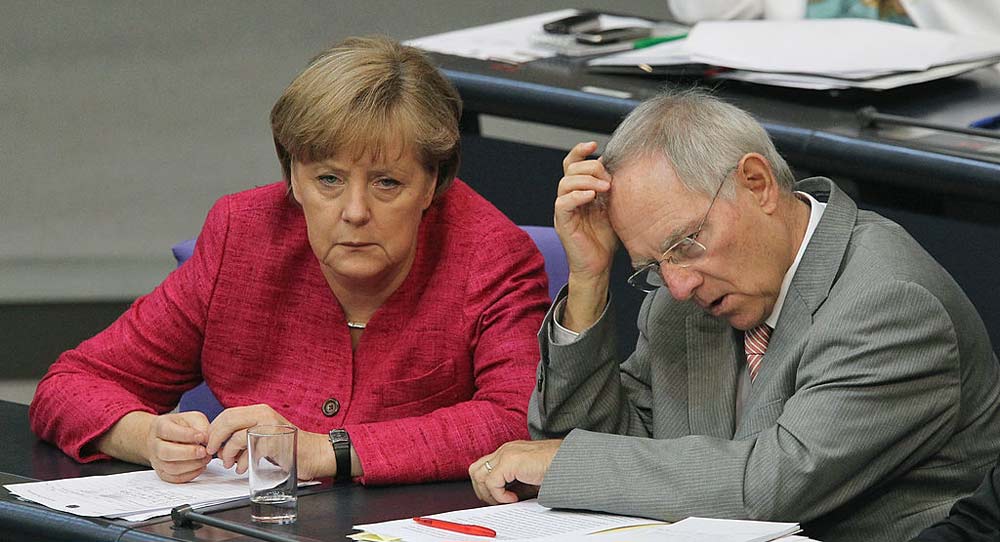As European leadership prepares for the sixteenth EU-India Summit, both sides must reckon with trade-offs in order to secure a mutually beneficial Free Trade Agreement.
Dinakar Peri
{
"authors": [
"Judy Dempsey"
],
"type": "commentary",
"blog": "Strategic Europe",
"centerAffiliationAll": "",
"centers": [
"Carnegie Endowment for International Peace",
"Carnegie Europe"
],
"collections": [],
"englishNewsletterAll": "",
"nonEnglishNewsletterAll": "",
"primaryCenter": "Carnegie Europe",
"programAffiliation": "",
"programs": [],
"projects": [],
"regions": [
"Europe",
"Western Europe",
"Germany"
],
"topics": [
"EU",
"Economy",
"Climate Change"
]
}
A selection of experts answer a new question from Judy Dempsey on the foreign and security policy challenges shaping Europe’s role in the world.
No, she isn’t. But that is hardly a consolation, because as far as economic reforms are concerned, the German chancellor has been busy doing nothing. The German economy is not in good form. Yes, unemployment is low and the budget is balanced, which makes Germany the odd man out in the club of large eurozone economies. But business investment has hardly moved for ten years. Productivity growth is exceptionally poor. The population is aging, and with declining rates of firm entry and exit, so is the economy. In the digital economy, Germany is a laggard, not a leader.
And the country’s economic growth? Sorry, but an economy that is growing solidly below 2 percent year after year simply isn’t strong. To that one can add the macroconditions for growth, which remain exceptionally supportive. The European Central Bank (ECB), still running negative interest rates, has its money printer sending €2 billion ($2.2 billion) a day into the eurozone, a good part of which ends up in German pockets and asset values. Don’t expect it to pass unnoticed when ECB President Mario Draghi begins to wind back this monetary support. Unfortunately, don’t expect either that the German chancellor will change tack. She will win, because Germans favor continuation over change.
Germany’s current economic strengths, such as strong competitiveness and low unemployment, are to a large extent the result of the economic reforms carried out in the previous decade. Now, however, Germany risks becoming complacent and squandering its economic success. Much-needed changes—for example, a rationalization of the byzantine tax system, investment in infrastructure and skills, and incentives for private investments—have received scant attention in recent years.
Of course, German Chancellor Angela Merkel’s government has faced a host of political challenges, from the refugee influx to the war in Ukraine to Brexit, that have absorbed much of the government’s attention. It is all the more important that after the September parliamentary election, Berlin puts economic reforms back on the agenda. So far, none of the German political parties has tabled convincing ideas on how to tackle future challenges such as digitization and an aging society. There is much focus on redistribution, which by itself will do little to preserve Germany’s economic strength.
Chancellor Angela Merkel has used Germany’s economic clout to maximize the country’s power in Europe. Today, few decisions can be made without German consent, while German unilateral steps invariably impact the rest of the EU. But power is a means to an end, and what end Merkel has in mind remains unclear.
Three issues stand out. First, Germany’s massive current account surplus is a major drag on eurozone demand. But in a transactional EU, it is also a major source of German bargaining power. How much will Merkel ask for in return for shifting Germany’s economic course?
Second, Germany’s predominance means Chinese and U.S. relations with Europe are increasingly reduced to discussions with Berlin. The annual meeting between the German and Chinese cabinets is arguably more consequential than the EU-China summit; and U.S.-German trade spats have the potential to infect transatlantic relations at large. Such reductionism will worry other European capitals and threatens to undermine EU cohesion. Despite outside incentives to the contrary, Germany must rigorously keep working through Brussels.
Third, geopolitics abhors an imbalance of power. With the Brexit talks under way, and French President Emmanuel Macron aligning himself with Merkel, Europe’s balance of power is shifting. Germany’s predominance may trigger a balancing response from other EU members. Paradoxically, German strength doesn’t make it any less tricky to keep the other EU capitals together.
Angela Merkel could not have started in more favorable economic circumstances when she became chancellor in 2005. German businesses had undergone a substantial restructuring process, Germany’s declining construction sector had just bottomed out, the world’s emerging economies were at the start of an unprecedented boom that required investment goods Made in Germany, German unions had practiced a decade of wage restraint, and her predecessor, Gerhard Schröder, had just revamped the labor market, even though the impact of those Hartz reforms on the German economy was modest.
But Merkel failed to live up to the challenges that the financial crisis and the euro crisis presented. She never understood the importance of macroeconomic or financial policies, except in the brief moment when she guaranteed German savers’ deposits (something that any German chancellor would have done). And the collapse of the euro was prevented only when the EU threw all four mantras of Merkel and her finance minister, Wolfgang Schäuble, out of the window: no banking union, no lender of last resort for sovereigns, austerity, and conservative monetary policy.
Merkel’s economic track record would be salvaged by domestic reforms. Alas, there were none, except for those few that the Social Democrats insisted on (extended childcare, parental benefits, minimum wage). There is no way around it: Merkel’s track record on economic policy is dismal.
There are limits to what a German chancellor can do. She can’t set interest rates or wage levels. Trade policy is the domain of Brussels, as is regulation of the EU single market. Still, Angela Merkel has left her mark on Germany’s economy. During the financial crisis, she single-handedly prevented the collapse of German banks by guaranteeing all deposits. Then she ditched the provisions of the Maastricht Treaty to save the euro (and, again, German banks).
However, the euro has become a soft currency for German manufacturers, which means that there is less pressure for them to innovate to remain competitive. Merkel’s green energy transition should have given German firms an edge in renewable energy technologies, but U.S. and Chinese companies proved more innovative. Where Merkel really slipped up was in blocking the merger of the European Aeronautic Defense and Space Company (EADS) and the UK’s BAE Systems in October 2012. A European-British defense consortium would have been a good antidote to Brexit, especially if Germany had spent what it should have on advanced weaponry.
After the September parliamentary election, Merkel will have to squander political capital and taxpayers’ money on reforming the eurozone together with French President Emmanuel Macron. Ideas like Eurobonds and a Marshall Plan for Southern Europe could make Germany economically weaker in the short term. If the result is a less dysfunctional union, so be it.
Just about any leader in the West would love to be in German Chancellor Angela Merkel’s position with her country’s economy. She and Finance Minister Wolfgang Schäuble have been cautious stewards and have not squandered their inheritance.
To be sure, there has been great criticism from the United States, the European Commission, and many in the EU member states of the massive German current accounts and budget surpluses, the latter now totaling about €24 billion ($27 billion). A little less than one-third of that will be spent on dealing with over 1 million refugees who could not find a home elsewhere in Europe. Germany’s defense budget will be increased by 8 percent in 2017, with more rises to come in the future. More needs to be spent on an aging infrastructure, the modernization of which is crucial to future German competitiveness.
Given that it is highly likely that the Merkel-Schäuble team will remain in power after the September parliamentary election, major increases in spending are unlikely. This may mean trouble for the eurozone and the prospect of a Franco-German compromise, but it will continue to be steady as she goes in Berlin.
Carnegie does not take institutional positions on public policy issues; the views represented herein are those of the author(s) and do not necessarily reflect the views of Carnegie, its staff, or its trustees.
As European leadership prepares for the sixteenth EU-India Summit, both sides must reckon with trade-offs in order to secure a mutually beneficial Free Trade Agreement.

Dinakar Peri
The hyper-personalized new version of global sphere-of-influence politics that Donald Trump wants will fail, as it did for Russia. In the meantime, Europe must still deal with a disruptive former ally determined to break the rules.

Thomas de Waal
2026 has started in crisis, as the actions of unpredictable leaders shape an increasingly volatile global environment. To shift from crisis response to strategic foresight, what under-the-radar issues should the EU prepare for in the coming year?

Thomas de Waal
A renewal of relations between France and Turkey is vital to strengthen European strategic autonomy. To make this détente a reality, Paris and Ankara should move beyond personal friction and jointly engage with questions of Black Sea security.

Romain Le Quiniou
Europe is designing a new model of collective security that no longer relies on the United States. For this effort to succeed, solidarity between member states that have different threat perceptions is vital.

Erik Jones